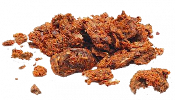 Propolis has been known to man for a long time to be a therapeutic agent. In ancient times, it was used as an antibiotic for craniotomy to eliminate the possibility of infection of the surgical procedure. There is a mentioning of propolis in the Quran. Avicenna called propolis black wax and used it in his medical practice. The ancient Incas used propolis in the treatment of diseases involving high body temperature. In Africa, at the end of the 19th century, during the Boer War, wounds were healed with propolis ointment. In the 19th century scientific medicine officially recognized propolis as a therapeutic drug and recommended it for the treatment of burns, wounds, and a number of other skin diseases. In the 1960-80s intensive clinical studies of native propolis were conducted and new medical compositions were created.
Propolis has been known to man for a long time to be a therapeutic agent. In ancient times, it was used as an antibiotic for craniotomy to eliminate the possibility of infection of the surgical procedure. There is a mentioning of propolis in the Quran. Avicenna called propolis black wax and used it in his medical practice. The ancient Incas used propolis in the treatment of diseases involving high body temperature. In Africa, at the end of the 19th century, during the Boer War, wounds were healed with propolis ointment. In the 19th century scientific medicine officially recognized propolis as a therapeutic drug and recommended it for the treatment of burns, wounds, and a number of other skin diseases. In the 1960-80s intensive clinical studies of native propolis were conducted and new medical compositions were created.
Propolis has an antimicrobial, antiviral, antifungal, anti-inflammatory effect which is sometimes superior in strength to antibiotics. It does not cause dysbacteriosis. It has the ability to stimulate both nonspecific and specific factors of immunity, to increase the complementary activity of blood serum, the phagocytic activity of leukocytes, the synthesis of gamma-globulins, agglutinins, precipitins and antioxidants.
Propolis has a pronounced anesthetic effect – 0.25% alcohol solution of propolis 3.5 times stronger than Cocaine and 5 times stronger than Novocain. This unique quality is successfully used in dentistry, surgery and dermatology. On contact with propolis, a dense albumin film is formed on the surface of the tissue. This protects the nerve endings, thereby reducing pain and at the same time reducing local bleeding and hyperemia. Propolis helps strengthen tooth enamel and prevent tooth decay. Therefore, it is quite often included in the composition of toothpastes. The use of propolis contributes to increased endurance and performance, as well as increasing body’s resistance to infections by boosting the immune system.
The listed properties of propolis have determined its active use, both in folk and official medicine, for the treatment of:
- diseases of the respiratory tract and lungs – tracheitis, bronchitis, bronchial asthma, pulmonary tuberculosis, bronchi, lymph nodes;
- cardiovascular diseases – hypertensive illness, stenocardia;
- diseases of the gastrointestinal tract and liver – gastritis, peptic ulcer, acute and chronic enterocolitis, chronic hepatitis, cholecystitis;
- skin diseases – dermatitis, dermatosis, viral, microbial and radiation lesions of the skin, neurodermatitis, eczema, psoriasis, nesting baldness, seborrhea, hair loss, youth warts, pyoderma, furunculosis, skin cracks, premature aging of the skin, skin tuberculosis;
- otolaryngologic diseases – rhinitis, laryngitis, pharyngitis, tonsillitis, antritis, otitis media, furuncle of the ear canal, hearing loss;
- dental diseases – stomatitis, caries, gingivitis, glossitis;
- gynecological inflammatory diseases;
- surgical diseases – fresh and difficult to heal wounds, burns and radiation injuries, frostbite, trophic ulcers, osteomyelitis, hemorrhoids, rectal fissures;
- eye diseases of inflammatory nature, eye injuries, burns, conjunctivitis, keratitis;
- diseases of the nervous system (headache, migraine, neuralgia, sciatica), hyperthyroidism;
- diseases of the joints, tendency to thrombus formation, benign and malignant tumors;
- diseases of the urinary tract and kidneys, prostatitis and prostate adenoma, kidney tuberculosis.
As a home remedy, propolis is often used for cuts, abrasions, minor burns, colds, stomatitis, tonsillitis, bronchitis, exacerbations of gastritis, peptic ulcer, and intestinal disease. However, as experience shows, uncontrolled use of propolis could lead to complications of an allergic nature and exacerbation or worsening of the underlying disease. It is advisable to coordinate each case of propolis use with a doctor who resolves issues such as:
- qualified diagnosis of the disease,
- evaluation of the severity of the pathology,
- taking into account indications and contraindications of the use of propolis,
- the method of introduction of propolis into the body, the dose, timing,
- if the propolis should be used alone or in combination with other medicines, phyto preparations or other beekeeping products.
As a stand-alone remedy, propolis is used for:
- mild illness;
- intolerance to prescribed drugs;
- as a prophylactic;
As an addition to medication therapy, propolis is used for:
- enhancing the effect of medicines, including antibiotics;
- stimulation of immunity;
- stimulation of the endocrine system;
- prevention of fungal complications;
- suppression of inflammation and stimulation of reparative processes;
- as a general tonic;
When propolis is used as a stand-alone, one should not count on a swift effect, although in some cases, especially with oral cavity diseases, this is possible. In the process of treatment, the patient must systematically visit the doctor in order to objectively evaluate the effectiveness of therapy, determine the complications that have arisen, and correct them.
Propolis has a beneficial effect on skin, mucous membranes, suppressing inflammation and itching, contributing to the rejection of necrotic tissues and enhancing reparative processes. It stimulates human endocrine system, reduces high blood pressure, cholesterol and triglycerides in the blood, suppresses lipid peroxidation, reduces platelet aggregation and the ability of blood to thrombus formation, and restores impaired blood circulation and vascular permeability in the area of the lesion. Propolis has hepatoprotective, anti-radiation, deodorizing, desensitizing and anti-toxic effects. It does not suppress the normal intestinal microflora.
